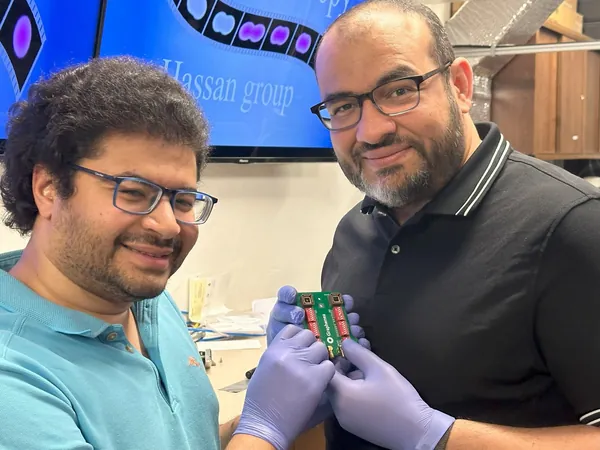
Revolutionizing Computing: Researchers Develop World's First Petahertz-Speed Phototransistor
2025-05-19
Author: Wei Ling
What If Computers Could Operate at Petahertz Speeds?
Imagine computers running at speeds a million times faster than today’s best processors! A groundbreaking team of scientists from the University of Arizona, alongside international collaborators, is turning this dream into a reality.
A Leap into the Future of Technology
In a stellar demonstration, researchers have discovered a method to manipulate electrons in graphene using lightning-fast light pulses lasting less than a trillionth of a second. This has led to immense breakthroughs in processing speeds, potentially reaching the petahertz range—over 1,000 times faster than modern chips!
Unleashing Quantum Powers
The study, recently published in Nature Communications, reveals how utilizing a quantum effect called tunneling allows electrons to bypass barriers almost instantaneously. Associate Professor Mohammed Hassan highlights that while AI technology has been advancing rapidly, hardware has lagged behind. But with these quantum breakthroughs, we can match hardware speed to software innovation, aiding fields as varied as space research and healthcare.
Behind the Breakthrough: The Brilliant Minds
Hassan’s team features top-notch colleagues from the University of Arizona and esteemed institutions like Caltech's Jet Propulsion Laboratory and Ludwig Maximilian University of Munich. They initially set out to explore the electrical conductivity of modified graphene when they stumbled upon the astonishing tunneling effect.
The Science of Discovery
As the team experimented, they observed that laser energy excites electrons within graphene, typically creating equal but opposing currents that cancel each other out. However, by tweaking the graphene samples, they noticed an electron was able to slip through, leading to unprecedented findings.
Creating the World’s Fastest Quantum Transistor
Using a high-speed laser that toggles on and off at an astonishing rate of 638 attoseconds, the researchers have engineered what Hassan proudly dubbed "the world's fastest petahertz quantum transistor." With one attosecond being a quintillionth of a second, this innovation marks significant progress in ultrafast computer technology.
A Game Changer for Everyday Electronics
Unlike many scientific breakthroughs that require extreme conditions, this transistor operates in ambient settings, paving the way for its use in everyday electronics. Hassan aims to collaborate with industry partners to bring this revolutionary technology to the market.
The Future Awaits!
"We aspire to lead in the field of fast computing technology and make the University of Arizona a name synonymous with pioneering advancements like the petahertz-speed transistor," Hassan asserts. A new era of computing is on the horizon—one that could radically transform how we interact with technology!



 Brasil (PT)
Brasil (PT)
 Canada (EN)
Canada (EN)
 Chile (ES)
Chile (ES)
 Česko (CS)
Česko (CS)
 대한민국 (KO)
대한민국 (KO)
 España (ES)
España (ES)
 France (FR)
France (FR)
 Hong Kong (EN)
Hong Kong (EN)
 Italia (IT)
Italia (IT)
 日本 (JA)
日本 (JA)
 Magyarország (HU)
Magyarország (HU)
 Norge (NO)
Norge (NO)
 Polska (PL)
Polska (PL)
 Schweiz (DE)
Schweiz (DE)
 Singapore (EN)
Singapore (EN)
 Sverige (SV)
Sverige (SV)
 Suomi (FI)
Suomi (FI)
 Türkiye (TR)
Türkiye (TR)
 الإمارات العربية المتحدة (AR)
الإمارات العربية المتحدة (AR)